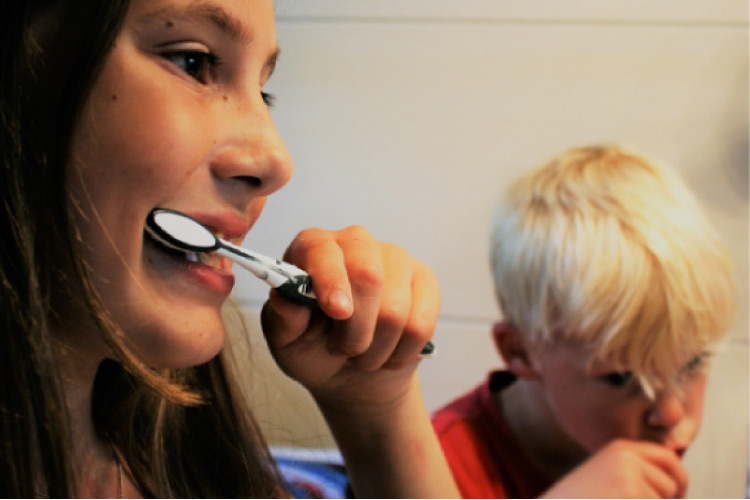
Have you heard anyone say that bad teeth run in their family? The primary reason that cavities have a tendency to “run in families” is because the bacteria that damage teeth are communicable. These bacteria thrive on sugars found in the mouth, multiply on dental surfaces and produce acids that destroy teeth.
While dental anatomy is hereditary, the bacteria responsible for tooth decay is often spread from parent to child through sharing food, utensils, straws, and even tasting your child’s food to test if it’s “too hot”. Did you know that tooth decay is the most common chronic childhood disease? Therefore, it is important to be ever vigilant to prevent your family from infection. Here are some healthy tips from our doctors.
Lead By Example
Brushing your teeth for two minutes twice a day and flossing once daily are essential. Children learn by studying the behavior of their parents, so it’s important to care for yourself so you can pass those habits down to your children.
Brush your teeth with your children so you can supervise and educate them. Make sure everyone washes their hands before and after caring for their teeth to prevent the spread of germs. Show young children how to vigorously brush all surfaces of their teeth with a child-size toothbrush and make sure they don’t brush too hard.
Most children lack the coordination to brush and floss on their own until they are six or seven years old, so be patient & encouraging. Flossing should begin when your child’s teeth start to grow together and the sides begin to touch.
Flossing sticks may be easier and more comfortable for your children until they are old enough to transition into using regular string floss on their own.
An Ounce Of Prevention
Fluoride toothpaste strengthens teeth and helps remineralize damaged enamel, which prevents cavities. Recent studies show that fluoride also makes it harder for bacteria to stick to teeth.
Using it early in your child’s life will provide extra protection for developing teeth. Brush your baby’s teeth twice a day with a clean damp cloth or infant toothbrush. You can smear on toothpaste but it is important to use only a dab, no larger than a grain of rice.
Between the ages of two and six, you can use a pea-sized amount of toothpaste on your toothbrush. Teach young children not to swallow their toothpaste. Some tubes of toothpaste are not recommended for children under a certain age, so read the manufacturer’s label.

Visit Your Dentist Regularly
While fluoride prevents cavities, it can’t do much for a cavity that has already formed. That’s why it’s important to get your regular checkups to prevent and stop cavities in their tracks before they spread to adjacent teeth or to your family members. Healthy people should get professional cleaning, x-rays, and exam twice a year.
People with health problems such as periodontal disease may need to be seen more frequently. Toddlers are at an increased risk for dental decay because the protective layer on their teeth is still developing. Cavities often appear between 15-18 months old.
This is an important time to ensure your child is visiting the dentist regularly. Talk to your dentist about other preventative measures such as fluoride treatments and sealants for your child.
Drink More Water
Sodas, juice boxes, and fruit juices are loaded with natural and artificial sugars which cause bacteria to accumulate in the mouth. To avoid unwanted sugars and tooth decay, cut back or eliminate sugary drinks. Water is the best choice for keeping your family hydrated. Drinking plenty of water during and after meals helps rinse food particles and bacteria. It also improves digestion!
To prevent decay in your baby’s teeth, don’t give your baby juice in a baby bottle, and don’t let your baby sleep with a bottle in his or her mouth. Talk to your doctor about letting your baby drink plain water if he or she is less than a year old. Do not give plain water to an infant under 6 months old.

Eat Smart
Choosing foods that are nutritious will help improve your oral health as well. Feed your family a well-balanced diet and be sure to incorporate plenty of fresh, raw, and cooked vegetables. A daily multivitamin supplement will help you achieve well-rounded nutrition. Talk to your doctor about supplements and dosages that are right for you and your family, as these needs can change over time.
To help keep you and your family healthy, visit your local Smiles Dental office. Contact us for more information and to make an appointment.

Discover the Smiles Dental difference today!
Are you ready for the happy, healthy smile of your dreams? When you choose Smiles Dental Services, you’re putting your smile in the hands of highly-trained professionals you can trust. Above all, we provide our patients with leading-edge dentistry that goes above and beyond to deliver high-quality results with a gentle, personal touch.